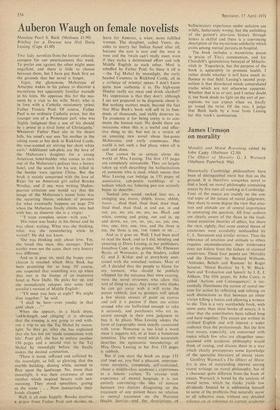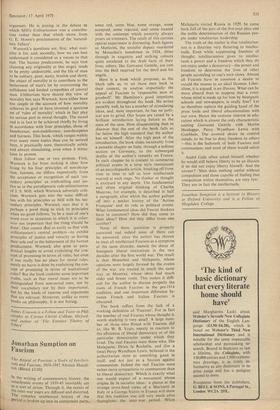James Urmson on morality
Morality and Moral Reasoning edited by John Casey (Methuen £2.50) The Object of Morality G. J. Warnock (Methuen Paperback 90p) Historically Cambridge philosophers have been of distinguished merit but thin on the ground. It is therefore somewhat novel to find a book on moral philosophy containing essays by five men all working in Cambridge. Four of the essays are mainly on the cen- tral topic of the nature of moral judgments; they share to some degree the view that emo- tion and attitude are of central importance in answering the question. All four authors are clearly aware Of the flaws in the tradi- tional emotivist theories of ethics, but share the view, rightly, that some central theses of emotivism were avoidably mishandled by C. L. Stevenson and similar writers. Thus the relevance of emotion and attitude to ethics requires reconsideration; their irrelevance does not follow from the failure of classical emotivism. These four papers are 'Morality and the Emotions' by Bernard Williams, 'Attitudes, Beliefs and Reasons' by Roger Scruton. 'Moral Realism' by S. W. Black- burn and 'Evaluation and Speech' by J. E. J: Altham. The fifth paper, by John Casey. is called 'Actions and Consequences': it suc- cessfully illuminates the nature of moral rea- sons for action by reflecting and refining on such distinctions as that between an obste- trician killing a foetus and allowing a woman to die. This is a very worthwhile book, with more unity than most books of essays; it is clear that the contributors have talked long and hard together. The essays are written in civilised English and will interest a wider audience than the professionals. But the first four essays, especially, are concerned with topics which few who are altogether unac- quainted with academic philosophy would think of raising, and discuss them in a way which clearly presupposes some knowledge of the specialist literature of recent years.
Geoffrey Warnock's The Object of Mora- lity is also of outstanding interest among recent writings on moral philosophy, but of a character quite different from the book of essays. Warnock is bored by the analysis of moral terms, which he thinks yields few dividends. Instead he is addressing himself to some of the problems that naturally occur to all reflective men, without any detailed reliance on or reference to current academic argument. He is joining in the debate to which Mill's Utilitarianism was a contribu- tion rather than that which stems from G. E. Moore's proclamation of the 'natural- istic fallacy'.
Warnock's questions are, first, what mor- ality is for, and, secondly, how we can best understand it considered as a means to that end. The human predicament, he says (not claiming any originality at this stage), tends to be pretty undesirable, and the life of man to be solitary, poor, nasty, brutish and short; the object of morality is to contribute to the betterment of man's lot by overcoming the selfishness and limited sympathies of amoral man. Utilitarians have shared this view of morality but, says Warnock, have either been too simple in the account of how morality achieves its goal or have invented a spurious set of 'rules of morality' which in fact play no serious part in moral thought. The moral end is in fact to be achieved chiefly by living in accordance with four principles, those of beneficence, non-maleficence, non-deception and fairness. This book, which ranges widely over many more topics than can be noticed here, is practically sane, theoretically subtle and always stimulating, even when it stimu- lates to protest.
Here follow one or two protests. First, Warnock is far from making it clear how living by his four principles of non-decep- tion, fairness, etc differs importantly from the acceptance or recognition of such 'sec- ondary principles' as truth-telling and jus- tice as in the paradigmatic rule-utilitarianism of J. S. Mill, which Warnock adversely criti- cises. Warnock gets into the same difficul- ties with his principles as Mill with his sec- ondary principles. Warnock says that it i5 Perhaps a good thing to stick to principles When no good follows, `to be a man of one's word even in situations in which it is other- wise not important that the thing should be done'. One cannot deal as easily as that with Utilitarianism's central problem---to exhibit Principles of justice and veracity as having their sole end in the betterment of the human Predicament. Warnock also goes to para- doxical lengths to avoid explaining the con- cept of promising in terms of rules; but even if one really has no place for moral rules, surely no harm is done by explaining the con- cept of promising in terms of institutional rules? But the book contains some important truths, such as that moral issues are to be distinguished from non-moral ones, not by their vocabulary nor by their importance, but by the kinds of reasons and arguments that are relevant. Moreover, unlike so many books on philosophy, it is not boring.
James Urmson is a Fellow and Tutor in Phil- osophy at Corpus Christi College, Oxford, and author of 'The Emotive Theory of Ethics'.







































 Previous page
Previous page